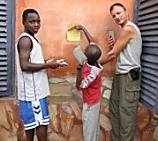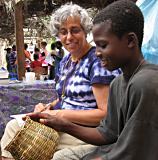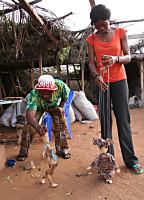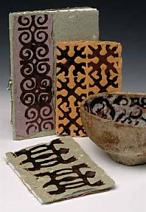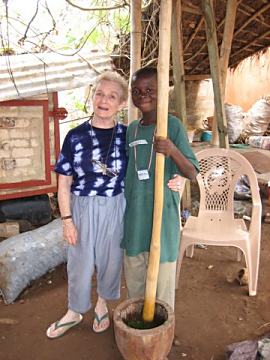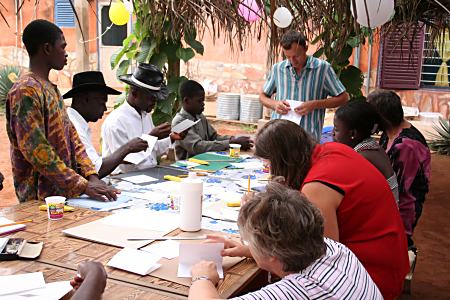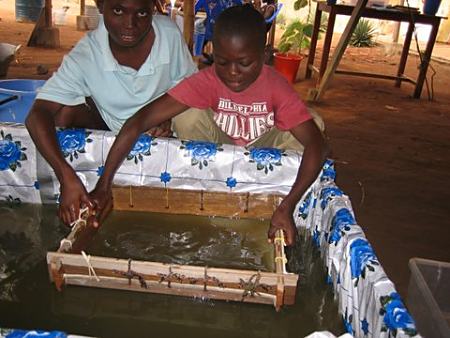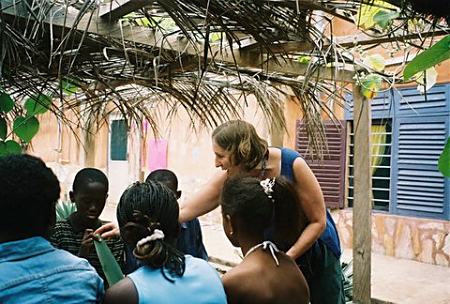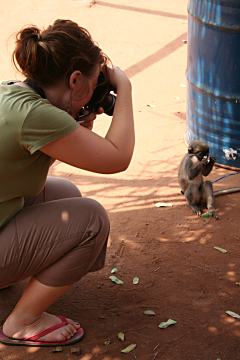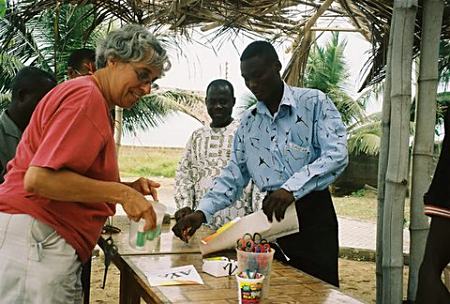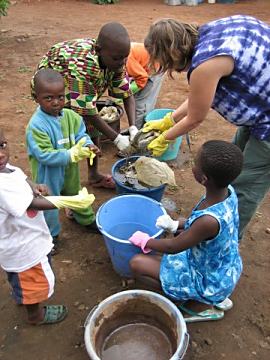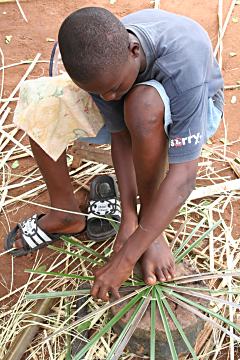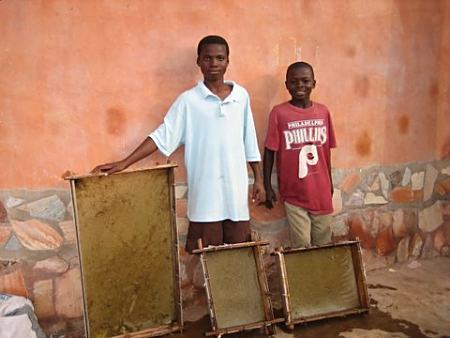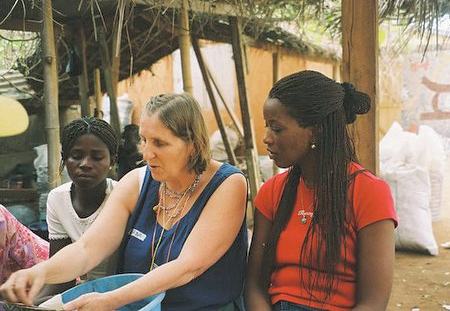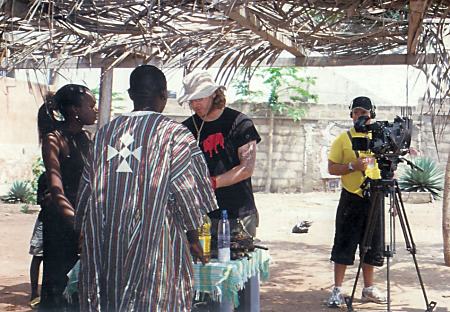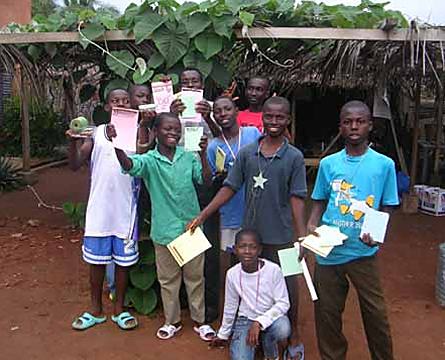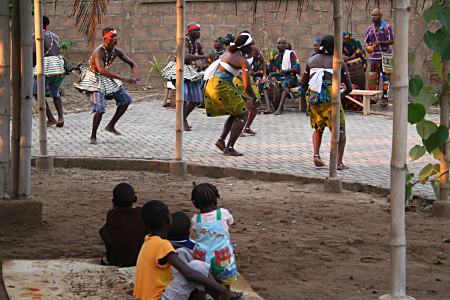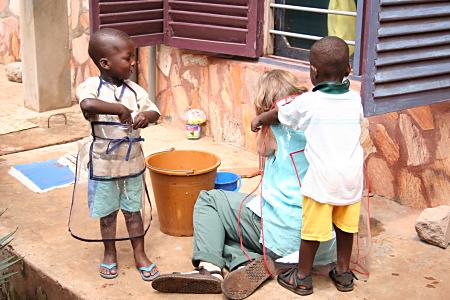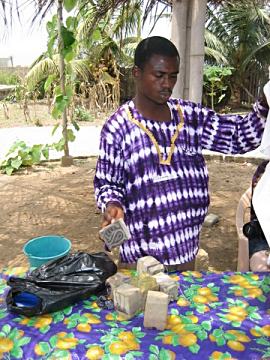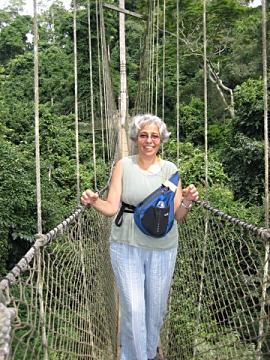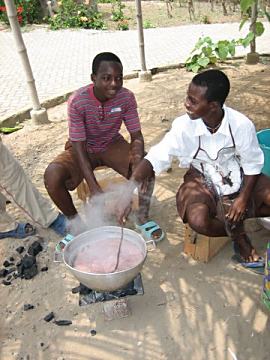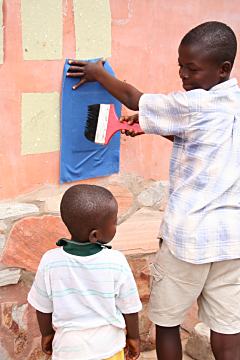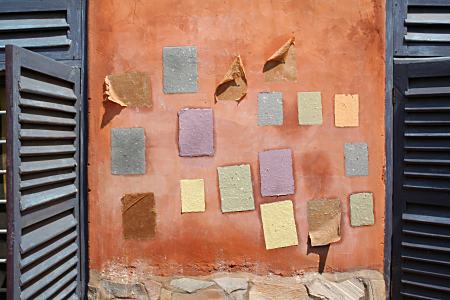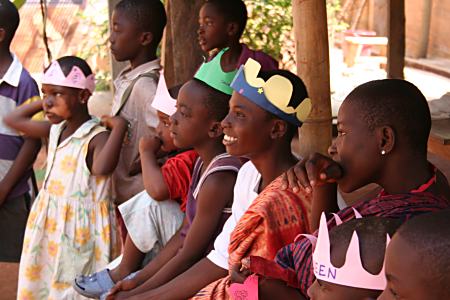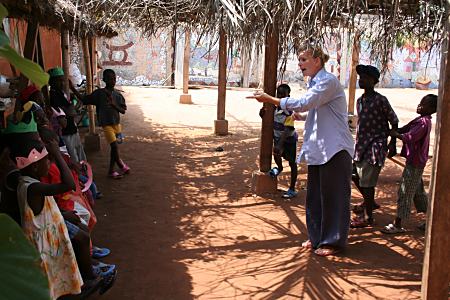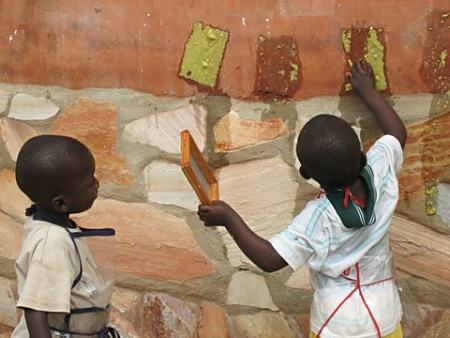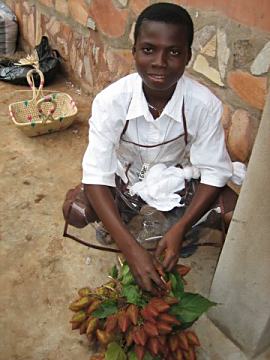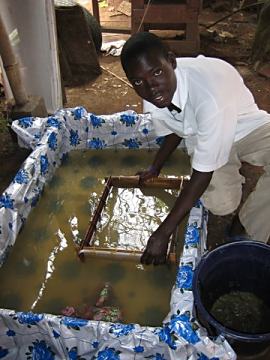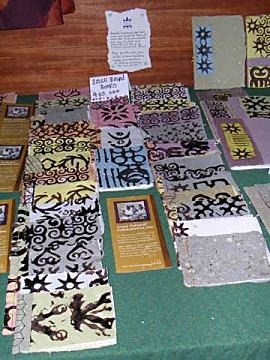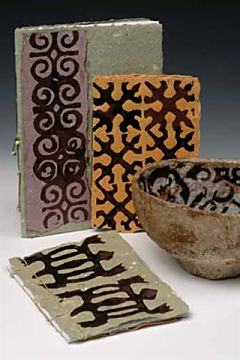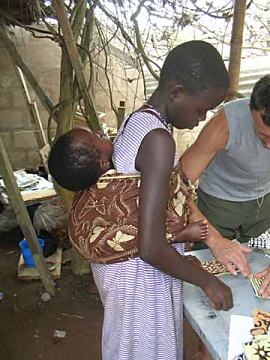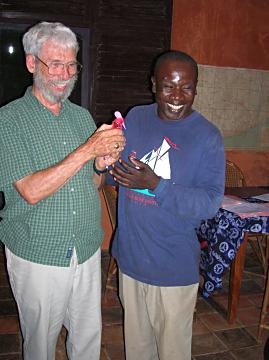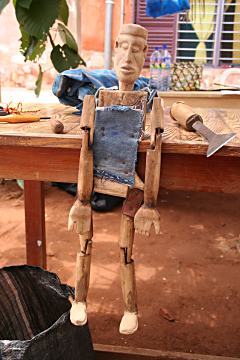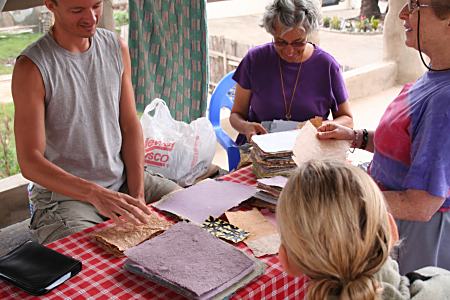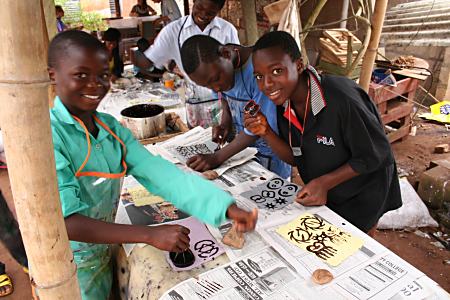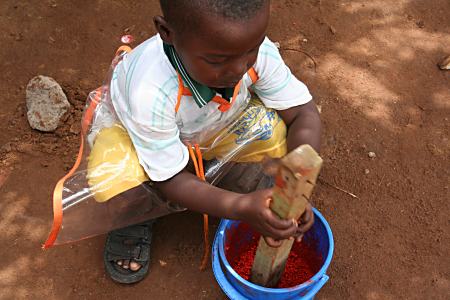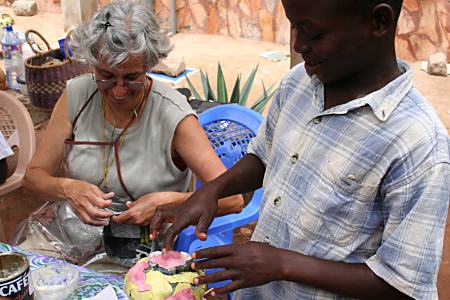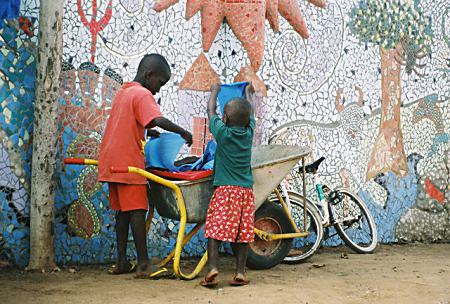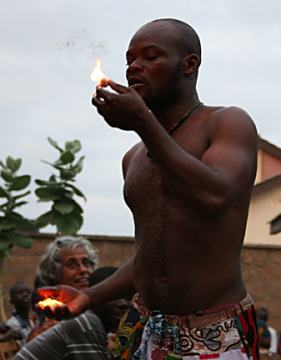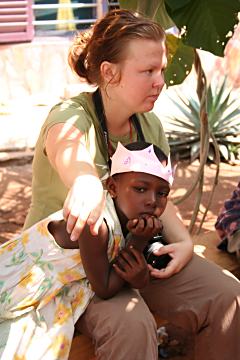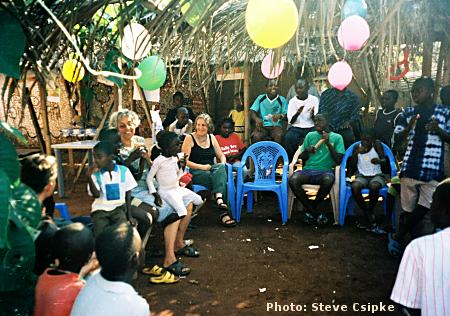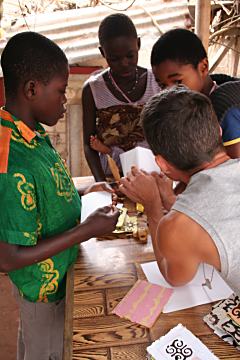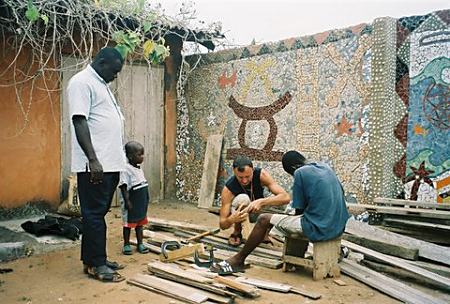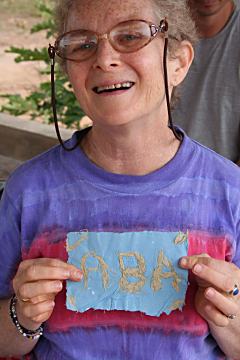Handmade Paper Production, Summer 2005
With Marta Herbertson, Shawn Sheehy and Jackie Abrams
Our focus this summer was setting up a handmade paper mill. Marta Herbertson, a paper artist from Australia and Shawn Sheehy, a paper artist and bookbinder from the USA spent the month of August experimenting with plants fibers and other indigenous materials and supplies. Although the time just flew by, they accomplished a lot and we have a sampling of paper and books to be continued next summer.
Jackie Abrams, a basketmaker and extraordinary teacher from the USA, was doing product development from the paper we produced. There was an intense interest in her paper basketmaking techniques.
The Nungua children were the intended students and, as usual, they were quick learners. They were also taught product development and created unique books and bowls. Long term plans, to be continued next summer, include fair trade marketing so that the children can earn school fees by selling their products.
As with every summer at Aba House, we had other activities also. We started with a group of Presbyterians from the Washington, D.C. area. In Ghana to visit a sister church, they stayed at Aba House and each evening we had interesting cultural discussions. The group even tried batik.
Then the South African TV crew arrived. Our house manager Talk True became a TV personality and was filmed giving a cooking lesson. It took all afternoon to film what will probably be a 5 minute segment. Then we all got to eat the food.
We had Margaret from Nigeria studying puppet making with Kobbi. Meg from the USA studying African textiles and Amy from the USA making bead connections for her jewelry business. Even John, our web designer, came from the USA to see what we were up to. There were many people both Ghanaian and visitors coming and going all summer and on August 27 we had a party to thank everyone who has helped Aba House and to celebrate our 5 year birthday. A professional drum and dance troupe as well as improvised drumming kept us going. The beer and good food helped too. A representative from the American Embassy in Accra presented Aba, Ben and Alice with framed certificates of thanks for contributing to cross cultural understanding and, as they say, a good time was had by all.
Perhaps the most unexpected was a performance by the children of Hamlet, produced and directed by Carol - student teacher from England.
Jackie's Story
I am home, with visions of Nungua (our Ghanaian neighborhood) still dancing in my head. Aba House, where we lived and taught and ate and danced, was our center - a place filled with the art created by both visiting and local artists, and even with the artists themselves - who were in and out all the time, just visiting, taking classes, bringing new work to the gallery, or coming to do some community drumming and singing. The yard filled with activities - our classes (papermaking, making books, even occasional baskets) as well as tie-dye, batik and Adinkra workshops. The ocean across the street. Roosters crowing at the break of dawn. (I sang the Bob Dylan song to myself every morning.) Even a pet monkey.
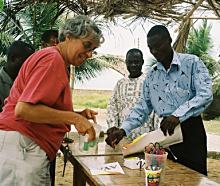 Out our gates and into the yards of our neighbors. There was a lot of extreme poverty. Overwhelming poverty.
No water, no sewer, no electricity. Families living together in one small room, struggling to find enough money for food, enough money for school fees. --- Despite all this (and I could go on and on),
we really did not see terrible despair. These people have a lot of positives in their lives. They have a strong social group and a strong culture. They were always friendly and kind to us --- even if
they did talk and laugh about us in their local dialect - and seem to really enjoy their friendships with the "obrunys" (white people) who stay at Aba House.
Out our gates and into the yards of our neighbors. There was a lot of extreme poverty. Overwhelming poverty.
No water, no sewer, no electricity. Families living together in one small room, struggling to find enough money for food, enough money for school fees. --- Despite all this (and I could go on and on),
we really did not see terrible despair. These people have a lot of positives in their lives. They have a strong social group and a strong culture. They were always friendly and kind to us --- even if
they did talk and laugh about us in their local dialect - and seem to really enjoy their friendships with the "obrunys" (white people) who stay at Aba House.
Down one short path and onto the main street--- a packed dirt road, dusty, cluttered with trash, roaming herds of goats and chickens, street stalls lining both sides selling anything you could imagine (from boiled groundnuts/peanuts to beautiful fabrics to coffins shaped like Mercedes). Music blaring, people talking and laughing, slowly strolling. Ghana time. Most things being carried on their heads - in boxes or baskets or bowls.The more time we spent there, the more people we knew who called to us in greeting. Or in the case of the kids, invited themselves along as our escorts.
We quickly learned to really appreciate what we had. The cool trickle of water that was our daily shower. (At least we had one!!!) A dirt yard that was swept clean every morning. The fresh fruit that was always available - pineapples, mangoes, paw paws (papaya). The incredibly wonderful dinners that were cooked for us at Aba House by Talk True -- who dispersed his (often questionable) wisdoms along with his food. Our driver Chuku - who bargained ruthlessly for us, and escorted us around to places we never would have gone.
We had many dancing and drumming sessions. Some planned, some impromptu. Kids and adults with all kinds of percussive instruments, everyone dancing, and everyone laughing at us dancing. All wonderful.
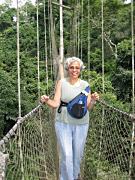 We had two weekends away -- one heading west to Cape Coast, visiting the castles where the slaves were taken to be housed
before boarding the ships. A very sobering experience. We also traveled to the national park and did a canopy walk. - The last weekend was a beautiful journey through the Volta region, the
southeastern part of Ghana that borders Togo. It is the agricultural center of Ghana, and the home to many Kente weavers. These weavers still use traditional simple looms, working outside
in sheds with their warps stretched out into empty yards. We visited some traditional villages of mud homes, thatched roofs, and children thrilled to pose for photographs. --- We had a few
day trips as well - once to the Bead Market, and another day for a complete tour and demonstration at a bead "factory." Shopping throughout Accra for our workshop supplies, following Chuku,
was yet another incredible experience.
We had two weekends away -- one heading west to Cape Coast, visiting the castles where the slaves were taken to be housed
before boarding the ships. A very sobering experience. We also traveled to the national park and did a canopy walk. - The last weekend was a beautiful journey through the Volta region, the
southeastern part of Ghana that borders Togo. It is the agricultural center of Ghana, and the home to many Kente weavers. These weavers still use traditional simple looms, working outside
in sheds with their warps stretched out into empty yards. We visited some traditional villages of mud homes, thatched roofs, and children thrilled to pose for photographs. --- We had a few
day trips as well - once to the Bead Market, and another day for a complete tour and demonstration at a bead "factory." Shopping throughout Accra for our workshop supplies, following Chuku,
was yet another incredible experience.
The most wonderful thing of all was the kids. Whenever we allowed it (which was frequently), our yard was full of the local kids - up to about 40 of them --- ages 3-16. The girls carrying younger children on their backs. Impromptu singing and dancing. They were thrilled to help make paper, to learn to make books, to use the mortar and pestle (making paper pulp instead of fufu or banku) - and were just happy to have positive feedback from us adults. It was not all easy - there was petty theft, fights, some chaos -- but it was all worth it for the incredibly great times we spent we them. They are the reason I want to return.
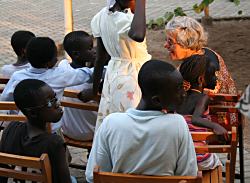 Our new Ghanaian friends were wonderful to us - inviting us into their homes and their lives, sharing their food and
culture and languages. Giving us gifts and more gifts. There was a wonderful mutual enjoyment in sharing our time together. Walks and talks and laughs - trying to understand what the other
person was saying. (English is the one "common" language.)
Our new Ghanaian friends were wonderful to us - inviting us into their homes and their lives, sharing their food and
culture and languages. Giving us gifts and more gifts. There was a wonderful mutual enjoyment in sharing our time together. Walks and talks and laughs - trying to understand what the other
person was saying. (English is the one "common" language.)
I worked with Marta and Shawn on our project, starting to set up a paper factory. They are both papermakers and book artists. Marta is a friend from Australia; Shawn joined us from Chicago. We really worked well together. It was not according to Plan A, or even Plan M.... but it was started. More work is needed, and is being thought about..... but we all feel that we succeeded. For our gala opening party, we were selling bowls, books, and cards from paper that we made using recycled and local vegetable fibers, often stamped with traditional Adinkra stamps and dyes. There was a lot of pride.
Aba (Ellie Schimelman) started Aba House several years ago, as Cross Cultural Collaborative. Using art as a common ground, she wanted to introduce people of different cultures, wanted the visitors to become a part of the Ghanaian community, to share cultures. Although there are many frustrations for her, I think that she is wildly successful.
The expression we used was "drink it in" - as we gazed about in wonder. Some days, by early in the morning, we thought we had had all the new experiences we could possibly manage in one day --- but then something else came along. We are full. It was magic.
-- Jackie, known at Aba House as Akua Jackline
Akua means girl/woman born on Wednesday. It also means I am automatically
part of a family of sisters of Akuas. A reason for more hugs and akwaaba
(welcome). Jackline because a 9-year old neighbor is named Jackline, and so I am just called Jackline as well.
![]()

